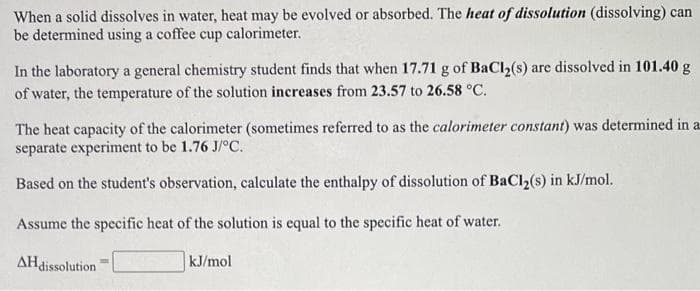When a solid dissolves in water, heat may be evolved or absorbed. The heat of dissolution (dissolving) can be determined using a coffee cup calorimeter. In the laboratory a general chemistry student finds that when 17.71 g of BaCl2(s) are dissolved in 101.40 g of water, the temperature of the solution increases from 23.57 to 26.58 °C. The heat capacity of the calorimeter (sometimes referred to as the calorimeter constant) was determined in a separate experiment to be 1.76 J/°C. Based on the student's observation, calculate the enthalpy of dissolution of BaCl2(s) in kJ/mol. Assume the specific heat of the solution is equal to the specific heat of water. AHdissolution kJ/mol
When a solid dissolves in water, heat may be evolved or absorbed. The heat of dissolution (dissolving) can be determined using a coffee cup calorimeter. In the laboratory a general chemistry student finds that when 17.71 g of BaCl2(s) are dissolved in 101.40 g of water, the temperature of the solution increases from 23.57 to 26.58 °C. The heat capacity of the calorimeter (sometimes referred to as the calorimeter constant) was determined in a separate experiment to be 1.76 J/°C. Based on the student's observation, calculate the enthalpy of dissolution of BaCl2(s) in kJ/mol. Assume the specific heat of the solution is equal to the specific heat of water. AHdissolution kJ/mol
Chemistry: Principles and Practice
3rd Edition
ISBN:9780534420123
Author:Daniel L. Reger, Scott R. Goode, David W. Ball, Edward Mercer
Publisher:Daniel L. Reger, Scott R. Goode, David W. Ball, Edward Mercer
Chapter5: Thermochemistry
Section: Chapter Questions
Problem 5.62QE: A 50-mL solution of a dilute AgNO3 solution is added to 100 mL of a base solution in a coffee-cup...
Related questions
Question

Transcribed Image Text:When a solid dissolves in water, heat may be evolved or absorbed. The heat of dissolution (dissolving) can
be determined using a coffee cup calorimeter.
In the laboratory a general chemistry student finds that when 17.71 g of BaCl2(s) are dissolved in 101.40 g
of water, the temperature of the solution increases from 23.57 to 26.58 °C.
The heat capacity of the calorimeter (sometimes referred to as the calorimeter constant) was determined in a
separate experiment to be 1.76 J/°C.
Based on the student's observation, calculate the enthalpy of dissolution of BaCl2(s) in kJ/mol.
Assume the specific heat of the solution is equal to the specific heat of water.
AHdissolution
kJ/mol
Expert Solution
This question has been solved!
Explore an expertly crafted, step-by-step solution for a thorough understanding of key concepts.
Step by step
Solved in 4 steps

Knowledge Booster
Learn more about
Need a deep-dive on the concept behind this application? Look no further. Learn more about this topic, chemistry and related others by exploring similar questions and additional content below.Recommended textbooks for you

Chemistry: Principles and Practice
Chemistry
ISBN:
9780534420123
Author:
Daniel L. Reger, Scott R. Goode, David W. Ball, Edward Mercer
Publisher:
Cengage Learning

Chemistry & Chemical Reactivity
Chemistry
ISBN:
9781337399074
Author:
John C. Kotz, Paul M. Treichel, John Townsend, David Treichel
Publisher:
Cengage Learning

Chemistry
Chemistry
ISBN:
9781305957404
Author:
Steven S. Zumdahl, Susan A. Zumdahl, Donald J. DeCoste
Publisher:
Cengage Learning

Chemistry: Principles and Practice
Chemistry
ISBN:
9780534420123
Author:
Daniel L. Reger, Scott R. Goode, David W. Ball, Edward Mercer
Publisher:
Cengage Learning

Chemistry & Chemical Reactivity
Chemistry
ISBN:
9781337399074
Author:
John C. Kotz, Paul M. Treichel, John Townsend, David Treichel
Publisher:
Cengage Learning

Chemistry
Chemistry
ISBN:
9781305957404
Author:
Steven S. Zumdahl, Susan A. Zumdahl, Donald J. DeCoste
Publisher:
Cengage Learning


Chemistry: An Atoms First Approach
Chemistry
ISBN:
9781305079243
Author:
Steven S. Zumdahl, Susan A. Zumdahl
Publisher:
Cengage Learning

Chemistry & Chemical Reactivity
Chemistry
ISBN:
9781133949640
Author:
John C. Kotz, Paul M. Treichel, John Townsend, David Treichel
Publisher:
Cengage Learning